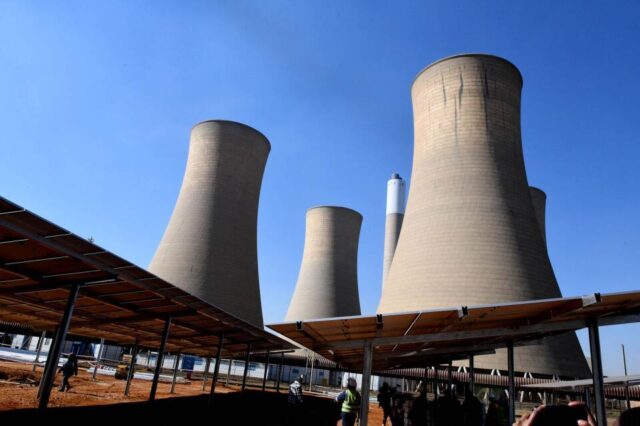The Presidential Climate Commission has referred a final decision on the decommissioning of the Komati Power Station back to government.
THE PRESIDENTIAL Climate Commission (PCC) has referred a final decision on the decommissioning of the Komati Power Station back to government.
Plans to turn the power station into a reneweable energy centre form part of the Just Energy Transition Partnership (JETP) that South Africa struck with the UK, US, France, Germany and the EU to support its decarbonisation efforts.
The PCC is a statutory body established by President Cyril Ramaphosa and required, according to its website, “to oversee and facilitate a just and equitable transition towards a low-emissions and climate-resilient economy”.
The PCC held its quarterly meeting on Friday to consider the final draft of its Komati decommissioning and repurposing process report.
The power station in Mpumalanga was decommissioned in October last year, with plans to turn it into a renewable energy site able to generate 150MW of photovoltaic energy and 70MW from wind generators, as well as to build a 150MW battery energy storage system and synchronous condenser.
This was part of the $8.8 billion (R164bn) concessional climate financing offered by some of the world’s richest nations to South Africa in 2021, to encourage the country to move away from fossil fuels.
However, PCC commissioners at the meeting were of different views about the future of the power plant, with some recommending it be mothballed, or be put into care and maintenance, rather than decommissioned, while others weighed in on the economic impact of both.
Speaking on behalf of business, commissioner Princess Tsakani Nkambule said the decommissioning of Komati and the finance mechanism of JETP should be reviewed.
“What we are saying is that the decommissioning schedule, Eskom’s programme, should be suspended for the time being or be slowed down,” Nkambule said.
“The other point was the issue of [the] grant, that the current structure of finance cannot be accepted as is because the grant portion is miniscule. For me, it’s not acceptable,” she said.
There has been an outcry over the negative economic impact of the decommissioning of Komati, with workers’ unions saying this process has led to abject poverty in the Nkangala District and in Mpumalanga as a whole.
The PCC’s head of mitigation, Steve Nicholls, said there was ongoing research, which should be completed in March next year, about the economic impact of closing coal-fired power plants in the country.
“We are running a programme with the University of Pretoria looking at the economic impacts of coal closure in Mpumalanga. And part of that programme is to look at the role of coal exports and how it might buffer, or not, those economic impacts,” Nicholls said.
“And, secondly, most of the energy modelling, and particularly that of the University of Cape Town, do not close coal plants or multiple them. They run them at very low utilisations. So you would ramp them up in [about] April to [about the] end of May/June in order to provide some security of supply in instances of penetration.”
However, commissioner Bongani Mwale, a community activist from Mpumalanga, said South Africa might be taken advantage of by the very same countries that were urging it to ditch coal for renewables.
“This issue is not really about coal exports, because coal exports will continue for as long as there is demand outside the country. The issue here is what are the lessons learned from the Russia-Ukraine war when it comes to this power station as a country,” Mwale said.
“How do you deal with the fact that these countries may be stockpiling our coal to fire their mothballed power stations during emergencies?
“We are saying, rather than closing or shutting down, let’s rather mothball this power station. Obviously these power stations, as and when there are emergencies in the country, will have to come back. But to shut down, I think it’s wrong.”
PCC deputy chairperson Valli Moosa, who was chairing the meeting, said he felt it was not up to the PCC to decide what should be the final verdict on Komati.
“I’m just wondering whether it is necessary for the commission to be making recommendations about whether an end of life of a power station should be shut down or decommissioned. I’m just wondering, is this really our job?” Moosa said.
“I think we’re biting off more than we can chew, because it’s not directly related to our work. It’s an important question, I would say, from a strategic point of view.
“My own view is that you mothball rather than decommission because you don’t know when you will need to start it up again. Like in Europe, they have started up many of their mothballed coal-fired power stations now with the Ukraine war.
“But I mean, is it for us to tell the government what to do about that? Isn’t it their job? It’s really not our job. We shouldn’t be taking it, even if we find it interesting or even if it is important. We should try to stick to our mandate as far as possible.”
– BUSINESS REPORT








